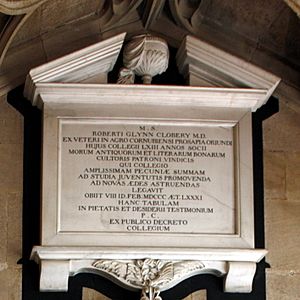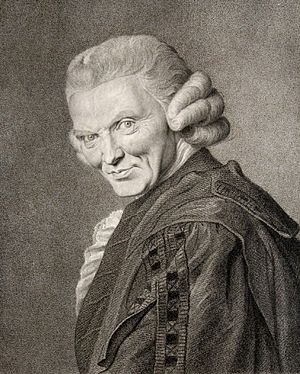Robert Glynn facts for kids
Robert Glynn (who later changed his name to Clobery) was an English doctor born on August 5, 1719. He was known for being kind and a bit unusual. He lived until February 6, 1800.
Contents
His Life Story
Robert Glynn was born in a place called Brodes in Cornwall. He was the only son of Robert Glynn and Lucy Clobery. He went to Eton College, a famous school, and then to King's College, Cambridge. At Cambridge, he studied medicine and became a Fellow, which means he was a senior member of the college.
After finishing his studies, he tried working as a doctor in Richmond, Surrey, for a short time. But he soon went back to Cambridge and stayed there for the rest of his life. He became a respected doctor in the area. In 1793, a famous politician named William Pitt the Younger offered him a top job as a professor of medicine at Cambridge, but Robert Glynn said no. He was very popular in Ely, Cambridgeshire, where he visited patients every week.

Later in his life, Robert Glynn inherited a lot of money from an uncle on his mother's side. Because of this, he added "Clobery" to his name. He passed away in his rooms at King's College, Cambridge, on February 6, 1800. He was buried in the college chapel at night, just as he had wished. There is a special plaque in the chapel to remember him.
What He Left Behind
Even though he was a successful doctor, Robert Glynn was known for being very generous. He wasn't super rich, but he always helped others. He left some of his land to a friend, John Henry Jacob. He also gave money to King's College, which was used to build new parts of the college. Some of the money also created a yearly prize for two students. He gave £5,000 to his friend Thomas Kerrich. A picture of him was drawn by Kerrich and made into an engraving in 1783.
His Personality and Work
Robert Glynn was quite unique in how he acted and dressed. People said he often wore a bright red cloak and a three-cornered hat. He also carried a fancy cane. He loved to speak his mind, no matter what. His tea parties were famous, and many students would come to them.
As a doctor, he was very careful and had good judgment. But he had a funny habit of almost always telling his patients to use a "blister" as part of their treatment. He strongly avoided giving patients certain medicines like opium or strong laxatives, and he never used bloodletting (a common treatment back then). He believed in living an active life outdoors.
He was friends with the poet William Mason and took care of another poet, Thomas Gray, when he was very ill. Robert Glynn was also very kind to his patients. He gave free advice to people from the Fens area and never charged fees to people from Cornwall or those who had gone to Eton College.
His Poetry
In 1757, Robert Glynn won the Seatonian Prize for his poem called The Day of Judgement. This prize was given for the best English poem. His poem was printed many times and included in several collections of poetry.
His Belief in the Rowley Poems
Robert Glynn was very interested in some old poems known as the "Rowley poems." These poems were actually fakes, written by a young man named Thomas Chatterton. But Robert Glynn believed they were real and very old. He even visited Bristol in 1778 to learn more about them. When the historian William Barrett died, Robert Glynn received the original fake writings by Chatterton. He later gave these important papers to the British Museum, where they are now kept in the British Library.
 | William M. Jackson |
 | Juan E. Gilbert |
 | Neil deGrasse Tyson |


